Summer reading: caitlin press
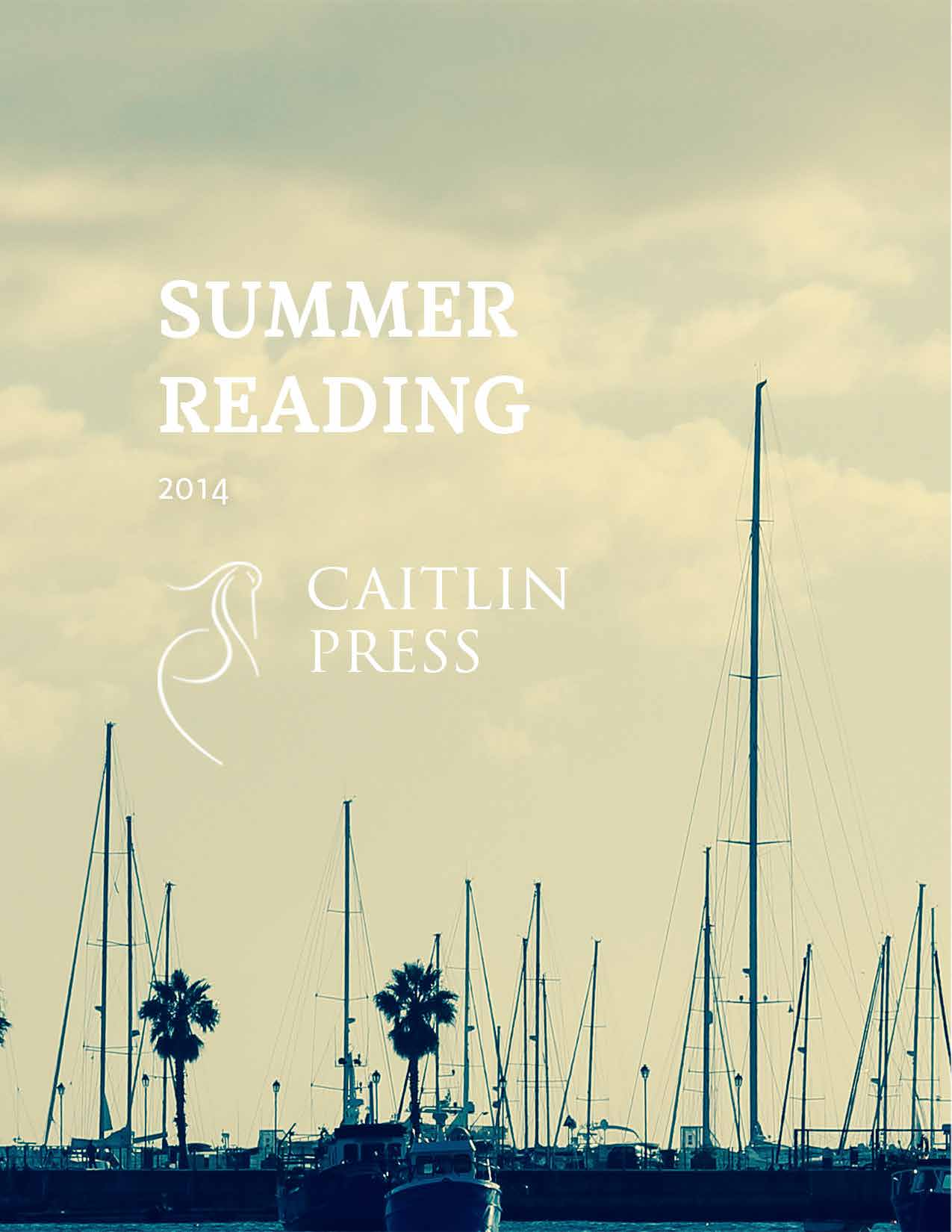
Excerpts from
DREAMLAND THEATRE
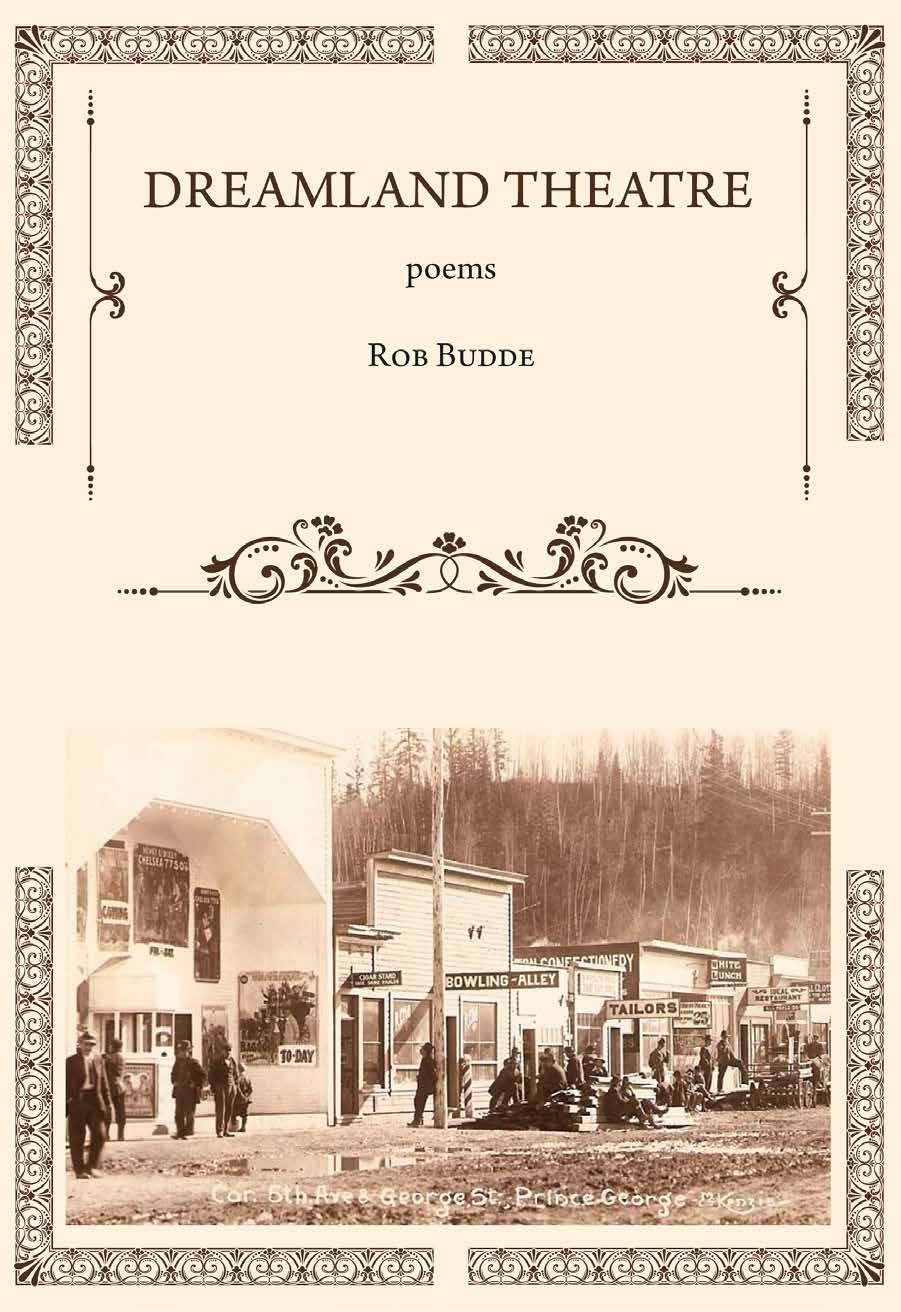
DREAMLAND THEATRE
The Dreamland Theatre exists in a photograph of a white building on sledges being pulled
through the mud from one location to another by a team of horses in Prince George
(then Fort George) circa 1912. These poems are about imagining place and, continuing
the work of Finding Ft. George, Rob Budde's process of trying—and failing—to find out
where he is. Poetry is part of a place, and this book deals in the powerful homemaking
that is language itself.
follow the crabapple blossom smell
not saying the word reliably, historical y
like weather or the knots
in thinking around
emotional language, tangled
in this bright mid-day moment (of reading)
and a pronoun .
and "you" is never easy —
a striated sign of things
to come and counter
to the sense of sentences, its ease
and assurance — so the word
"with" becomes still uneasier and
I walk into the sunlit room,
poem in hand, a proximity,
molecular and climatic,
twined and tugging tight
half listening to the news
of storms forming
over the warming oceans .
a deligitimized ground, standing
there, as if through some accuracy
of scientific instrumentation, who
is who's target is the question and
the water line wavers in the re
calculations — you look up your altitude
in an archaic book of symbols,
you look up and tell me we need
love is resistant to anti-
biotics, bodies react to themselves
and become something else; later
we hear 21st century love retreated from the coasts,
subsided in the mountains, subsisted
on salmon and blueberries .
we read "faith" in the remaining
records — but these codes
fail, these letters fall stil , cars by the side
of the highway house
sparrows and squirrels,
a reorganized polis .
and I'd like to think
of us, by the side of the derelict
highway, bereft and happy,
a fistful of yarrow and a wooden cup of tea
the future tense may
be the poem's love sprung
from the old language
‘en cha khuna'
Nechako and Fraser, two
languages and a third
discovery, on the south-
side portage: a recollection, a passage
by need or want, the provisions
carried from the west
the salmon run, grease, at least then
east through the passes to Beaver
in 1907, I would say to you
‘snachailya, musicho'
as a guest and co-explorer
gold and horses
cross paths with the soft-speakers
the ash of ancestors misread
and the language crashes in
of watersheds, neural directions
we take from topography,
wood a texture against our backs
as we rest, historicize, work
in a different economy,
a training of tongues to
carry this wet ‘lh', or
a collective barrier protecting
this lake, these rivers, this place:
a body placed in harm's way
up here where
there is no pressure to conform
to urban forms — here, identity is
a new stride, cleaner, smarter
and knowing how to say it
sea otter catches colonization under a rock, stanley park
still salty Salish air in fal
and the small flounder crunches
between her teeth
the otter numbers are up
not like stocks but spirits
she sits on a rock munching
the discourse called trade
that Spanish / Russian / British squeeze
in the straits when skins
came off with a sick sucking noise
globalization dribbles off her pelt,
her nonchalance, her pregnant bel y,
this counter-colonial moment in
English Bay, the tide just turning
her satisfaction in being
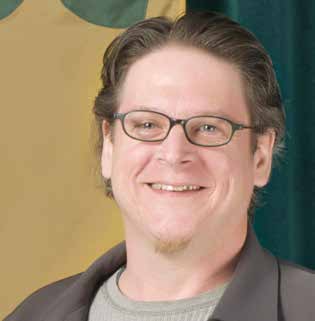
Rob Budde teaches Creative Writing at the University of Northern British Columbia in
Prince George. He has published seven books (poetry, novels, interviews and short fic-
tion) and appeared in numerous literary magazines including Canadian Literature, The
Capilano Review, West Coast Line, Dusie, ditch, filling Station, Prairie Fire, Matrix, and
dandelion. He is also a regular columnist for Northword Magazine. His most recent books
are declining america (BookThug), Finding Ft. George (Caitlin Press) and Dreamland The-
atre (Caitlin Press).
Purchase Dreamland Theatre from:
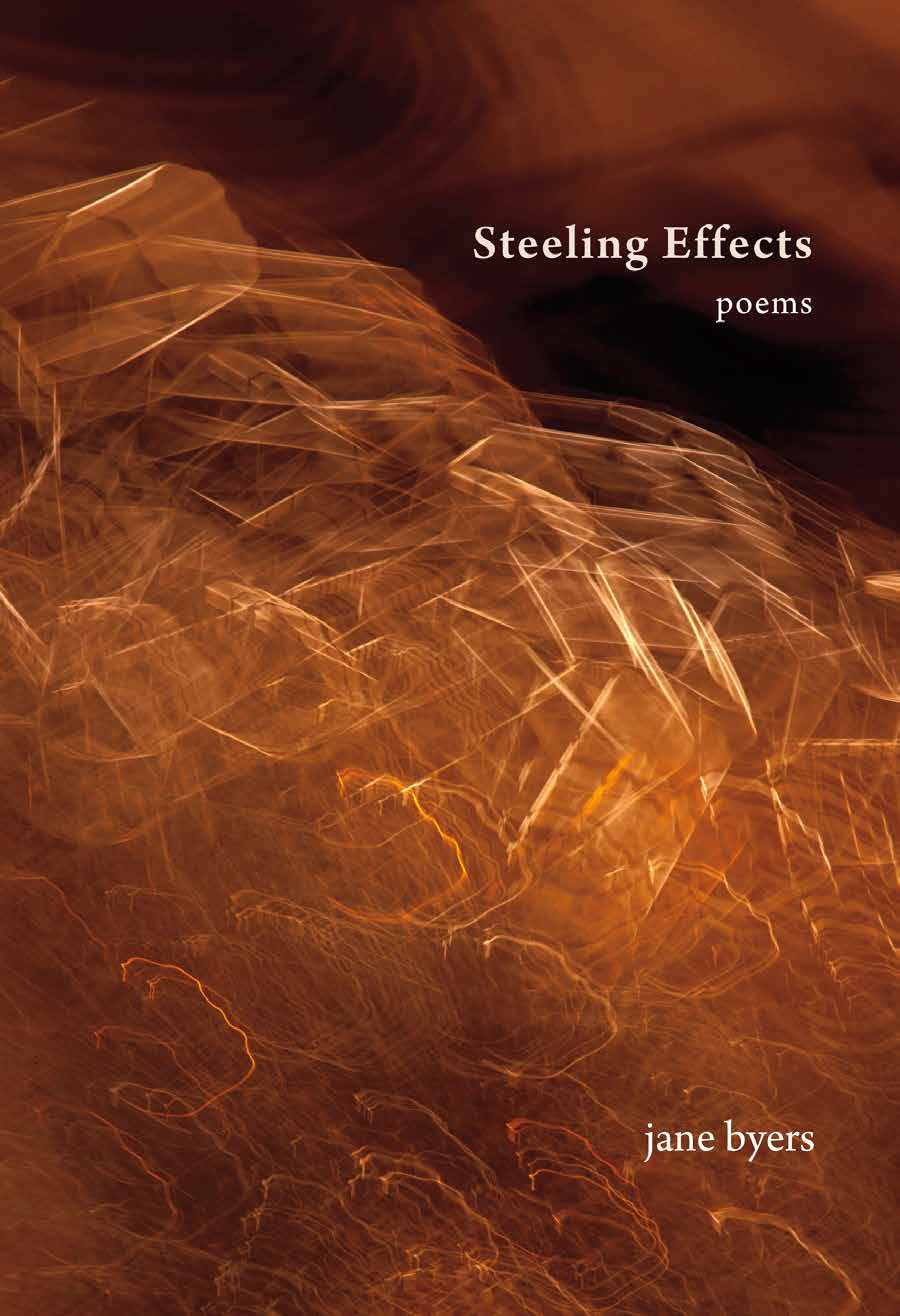
Why do some of us learn to bend? Others break? How do we move from shame to being
"enough"? How do we bounce back stronger after adversity and then embrace our own hu-
manity with its flawed beauty?
In her first full collection of poetry, Jane Byers explores her personal experience with re-
silience, beginning with her own difficult birth, which she describes as inoculation against
despair. As a young adult, the writer moves from complicity and its il usion of power to
building a pliant self. Byers turns an unflinching eye to parenthood, as the mother of adopt-
ed twins, and examines the workplace through the eyes of a female safety specialist working
alongside firefighters, transportation crews and heavy equipment purchasers. The author
draws on the steeling effects of being queer to imbue her children and injured workers with
A late fall swim in an alpine lake; a woman in the twilight of life, risking delight. Red
thermometers of grass shed their glistening mercury in a fever of gratitude; to tumble from
the divine is to be alive in the pungent beauty that the so-called mundane has to offer.
Steeling Effects asks whether what doesn't kill you makes you stronger and "lives" its way
into the pliant beauty that gratitude affords.
Yesterday's platinum injection offers protection
from the artery ballooning at the base of your brain.
Stil , damage is done:
a chaos of blood uncontained,
your motherly eyes stray.
The nurse, a whir,
changes IVs, leans down,
checks the yellow catheter.
She dispenses relief
for your invaded cranium,
jots on your chart
and nods in our general direction.
You remember to smile and be gracious,
but forget your name.
Recognition spreads across your face
as you look at the rainbow rings
that have escaped the col ar of the nurse's uniform.
"So, you're a lesbian," you say, clear as day.
The nurse pauses, rechecks fluid levels, the catheter—
hesitates, cautious as truth colours this dingy room.
Before the reply, your shaky arm points.
"It's okay, my daughter is too."
So relieved to hear you remember,
I forget my shame; begin to shed restraint.
As hope pools in the base of my brain,
we slip into intensive recovery.
South Pole
My daughter is wailing again about what is not here.
Not her other mama, presently at work,
not her nana who raised her for the first year,
not her blue car in the drive (see mama, above).
If she knew that olive trees don't grow here, she'd mourn them too.
Or tsetse flies, or oranges—
she's predisposed.
At a loss while she sobs, I'm reading her a book before nap.
It's called Lost and Found:
a boy finds a penguin,
tries to repatriate it to the South Pole,
the penguin stands forlorn on the ice
as the boy rows away in his boat.
My daughter says, "Sometimes you leave me at the South Pole and
that makes me sad."
I row through our tears,
vowing to keep her close.
Where have I left her?
Like a politician, I blame the previous administration.
The boy returns for the penguin;
eventual y, they find each other and go home.
Alone, in a quiet dawn, I scan the horizon for any truth.
The gap left in the birth mother's wake is a kind of truth
but so, too, is this—
primal loss repels primal loss.
I must re-examine my own southern jaunt.
Left adrift, I, too, know despair.
We must make our way back north
to that tropic of love.
Skunk cabbage erupts in the perimeter woods,
Skunk and cabbage.
Bright yellow spathes,
tightly wrapped romaine
unfurl their smel ,
displeasing us.
Swamp lanterns light up a dim day
on this path between manicured woods and granite wal s.
First blooms in spring—nourishment for bears,
preserving wrap for salmon,
reluctant food in times of famine.
I wasn't thinking of quitting my job on this morning walk,
but the plant has convinced me
the logic of paycheque and pension is overrated.
Art, too, can be this brash, nonsensical—
plant that smel s like an animal and is named for food.
Untamed, I will write, spathed in red, diaphanous spirit
that neither protects nor explains.
Not animal nor plant.
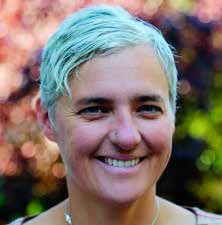
Jane Byers lives with her wife and two children in Nelson, British Columbia. She writes
about human resilience in the context of raising children, lesbian and gay issues, sexism,
local geography and health and safety in the workplace. She spent many years working for
the City of Toronto in corporate health and safety and now works at WorkSafeBC where she
continues to facilitate resilience in injured workers. She has had poems, essays and short
fiction published in a variety of books and literary magazines in Canada, the US, and the
UK, including Grain, Rattle, Descant, the Antigonish Review, the Canadian Journal of Hock-
ey Literature and Our Times. She is a three-time winner of the Nelson and District Poetry
Purchase Steeling Effects from:
ABOUT CAITLIN PRESS
Caitlin Press was established in 1977 by Carolyn Zonailo as a feminist literary press. In the
1980s, the mandate was expanded to that of a BC literary press.
Caitlin Press publishes cultural y significant books, including fiction, non-fiction (both
historical and creative), and poetry. Occasional y we will produce a children's or young
adult title.
In addition to its regional mandate Caitlin Press will honour its original roots by actively
seeking, promoting and publishing work by and about BC women.
This fal , Caitlin offers more exciting poetry from both emerging and established writers.
Drawing on scientific studies of salmon recycling in perhumid rainforests, Derrick Stac-
ey Denholm's Dead Salmon Dialectics follows the dark and often humorous trial of a young
biologist at work in the wildest estuaries of the rainiest place on earth.
Art, children, marriage, breaking, rejoicing. Love is a many-branched tree and in Jane
Eaton Hamilton's third poetry collection, Love Will Burst Into a Thousand Shapes. It's au-
tumn or winter, the winds are kicking up and branches are flying everywhere—bursting
into a thousand shapes.
All these shapes lend raw material for a poem: Mothers lose their babies. A boy loses his
leg to war. A girl hides from serial killer Richard Speck. A virgin gets pregnant. A partner
mourns a death at Walkerton. Women tumble into love, celebratory and foolhardy.
"Love Will Burst into a Thousand Shapes is jazzy and engaging. Hamilton proves herself to
be a real wordsmith, with a trickster's soul and a heart as big as New Mexico. The poems are
enlightening, risky, rough, funny as hel , and ultimately very moving." —Barry Dempster
"Hamilton's poems are too luscious, too seductively vexatious to read at arm's length. Love
Will Burst into a Thousand Shapes is an immersive reading experience—where place, mem-
ory and meaning are explored with crisp, keen eyes." –Amber Dawn
ABOUT THIS PUBLICATION
This digital sampler was distributed by Contemporary Verse 2 in the summer of 2014.
To download samplers from additional publishers, visit:
Cover photo by Caroline Gutman
Source: http://www.contemporaryverse2.ca/images/files/Sampler-Caitlin-Press-2014.pdf
ISSN 2349 – 4425 www.americanij.com The Protective Effect Of Some Natural Antioxidants Against Azithromycin Induced Testicular Dysfunction In Rats El-Dakak, Abeer M. N. H.Ph.D Special Food and Nutrition Dept., Food Technology Research Institute, Agric. Res. Center, Giza, Egypt Email address: [email protected]
Lettera aperta ai Parlamentari "Consensus Internazionale" (le nostre tesi scientifiche) Appendice (1) - Patologie e condizioni che possono mimare l'ADHD Appendice (2) - Chi ha sottoscritto le nostre tesi scientifiche Appendice (3) - L'opinione degli esperti Appendice (4) - Bozza di interrogazione Parlamentare LETTERA APERTA AI PARLAMENTARI ITALIANI Illustrissimo Parlamentare, "Giù le mani dai bambini" ®, comitato che consorzia 115 realtà




